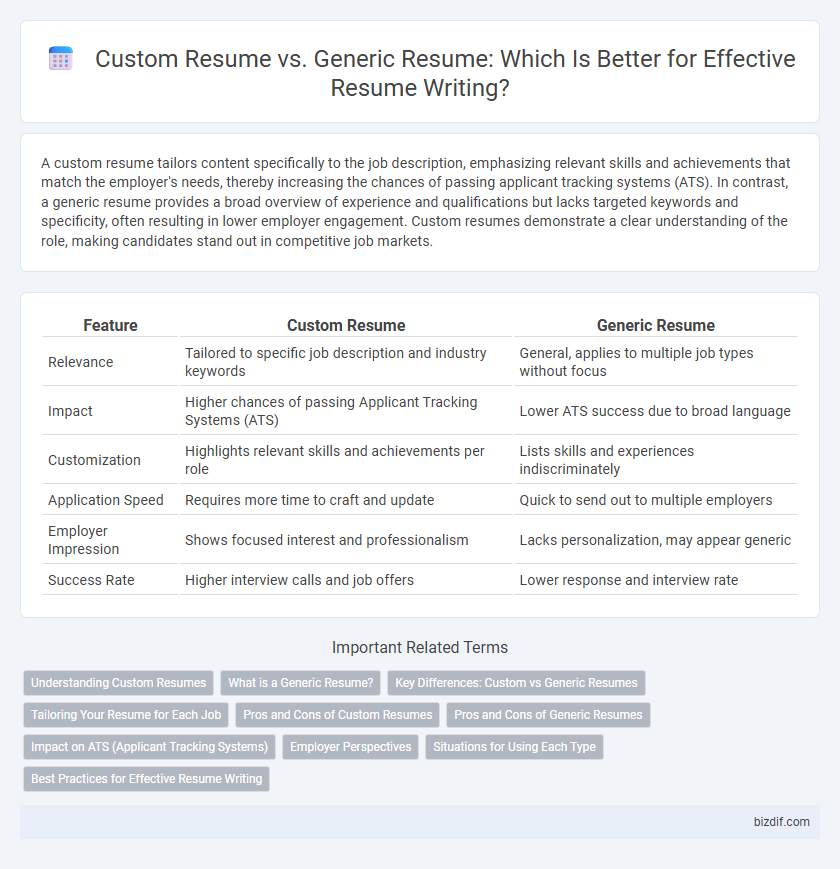A custom resume tailors content specifically to the job description, emphasizing relevant skills and achievements that match the employer's needs, thereby increasing the chances of passing applicant tracking systems (ATS). In contrast, a generic resume provides a broad overview of experience and qualifications but lacks targeted keywords and specificity, often resulting in lower employer engagement. Custom resumes demonstrate a clear understanding of the role, making candidates stand out in competitive job markets.
Table of Comparison
| Feature | Custom Resume | Generic Resume |
|---|---|---|
| Relevance | Tailored to specific job description and industry keywords | General, applies to multiple job types without focus |
| Impact | Higher chances of passing Applicant Tracking Systems (ATS) | Lower ATS success due to broad language |
| Customization | Highlights relevant skills and achievements per role | Lists skills and experiences indiscriminately |
| Application Speed | Requires more time to craft and update | Quick to send out to multiple employers |
| Employer Impression | Shows focused interest and professionalism | Lacks personalization, may appear generic |
| Success Rate | Higher interview calls and job offers | Lower response and interview rate |
Understanding Custom Resumes
Custom resumes improve job application success by tailoring skills and experiences to specific job descriptions, increasing relevance to recruiters. They highlight targeted keywords and achievements that match the employer's requirements, enhancing applicant tracking system (ATS) compatibility. Personalized resumes demonstrate a clear understanding of the role, setting candidates apart from those submitting generic resumes.
What is a Generic Resume?
A generic resume is a broad, one-size-fits-all document designed to be used for multiple job applications without tailoring to specific roles or industries. It typically includes general skills, experiences, and education that are relevant to a wide range of positions. While convenient, a generic resume may lack the targeted keywords and customized achievements that applicant tracking systems (ATS) and hiring managers look for in specialized job applications.
Key Differences: Custom vs Generic Resumes
Custom resumes precisely target specific job descriptions by incorporating relevant keywords and tailored accomplishments, enhancing applicant tracking system (ATS) compatibility and improving interview chances. Generic resumes provide a broad overview of skills and experience without customization, often resulting in lower engagement from recruiters and reduced relevance to particular roles. Emphasizing customization in resumes significantly boosts alignment with employer expectations and increases the likelihood of advancing in competitive hiring processes.
Tailoring Your Resume for Each Job
Tailoring your resume for each job significantly increases your chances of passing applicant tracking systems by incorporating relevant keywords and skills specific to the job description. Custom resumes highlight your most pertinent experiences and achievements, making it easier for recruiters to see your fit for the position. A generic resume often lacks this focus and may be overlooked due to its broad and non-specific content.
Pros and Cons of Custom Resumes
Custom resumes enhance job application success by tailoring content to specific roles, highlighting relevant skills, and matching keywords from job descriptions, which improves applicant tracking system (ATS) compatibility. They require more time and effort to create compared to generic resumes, potentially limiting their use when applying to multiple positions rapidly. However, the increased relevance and personalized approach often result in higher interview callback rates and better alignment with employer expectations.
Pros and Cons of Generic Resumes
Generic resumes offer the advantage of quick preparation, making them suitable for broad job applications but often lack the specificity to highlight relevant skills and experience for individual roles. Their major drawback is reduced effectiveness in applicant tracking systems (ATS) and recruiter screenings, as they fail to include tailored keywords and accomplishments crucial for targeted job descriptions. Despite saving time, generic resumes may result in lower interview rates compared to customized resumes that align closely with job requirements and company culture.
Impact on ATS (Applicant Tracking Systems)
Custom resumes significantly improve ATS compatibility by using tailored keywords and phrases directly aligned with the job description, increasing the likelihood of passing initial automated screenings. Generic resumes often lack specific industry terms and precise formatting, resulting in lower ATS scores and reduced chances of progressing to human review. Incorporating relevant skills, job titles, and quantifiable achievements targeted to the role optimizes a resume's impact within ATS algorithms.
Employer Perspectives
Employers prioritize custom resumes that align with specific job requirements, as they demonstrate a candidate's genuine interest and tailored skillset. Generic resumes often lack targeted keywords and relevant experiences, making it difficult for hiring managers to assess suitability efficiently. Custom resumes enhance applicant tracking system (ATS) compatibility and increase the chances of progressing to interviews from the employer's perspective.
Situations for Using Each Type
Custom resumes excel in job applications requiring precise alignment with specific skills and qualifications, such as niche industries or competitive positions. Generic resumes suit situations like initial job searches or career fair submissions, where broad experience showcases versatility. Tailoring resumes maximizes relevance, while generic formats emphasize adaptability and volume distribution.
Best Practices for Effective Resume Writing
Custom resumes tailored to specific job descriptions increase applicant tracking system (ATS) compatibility and highlight relevant skills, enhancing interview chances. Incorporating targeted keywords, quantifiable achievements, and clear career objectives aligns your resume with employer expectations and industry standards. Avoid generic templates by adapting content to each role, ensuring clarity, concise language, and professional formatting to maximize recruiter engagement.
Custom resume vs Generic resume Infographic

 bizdif.com
bizdif.com